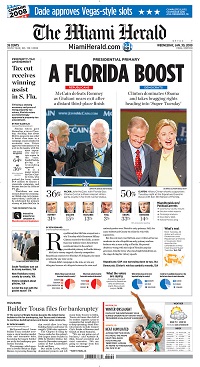As reported in The Miami Herald
SECURITIES
Investors allegedly lost millions buying risky, mortgage-backed securities pitched by a Broward County stockbroker now on trial in federal court.
BY DAN CHRISTENSEN
A Hillsboro Beach stockbroker made a fortune peddling risky, complex mortgage-backed securities to mom and pop investors — including Florida’s poet laureate — who ended up losing millions, regulators say.
The Securities and Exchange Commission’s civil complaint asserts that Jamie Solow, 46, ran a fraudulent trading scheme so devastating it also put two brokerage firms out of business.
This month, several giant investment banks disclosed billions in losses due to the nationwide meltdown in subprime mortgage securities and other risky debt. But Solow’s trial, which began last week, is putting the spotlight on another class that has suffered large mortgage-related losses: the individual investors who bought those securities. Solow is expected to testify in his own defense Tuesday in federal court in West Palm Beach.
”I trusted him,” testified Tony Stevens, 81, a semiretired trumpet player and singer from Sunrise who gave Solow $217,000 in life savings to manage. “I lost everything.”
Florida poet laureate Edmund Skellings is also on the government’s witness list. Skellings, who recently moved from Davie to Melbourne, lost about $300,000 that he invested with Solow, according to testimony on Monday. Skellings declined comment.
Solow, who lives in a $7 million oceanfront home on the ritzy stretch of A1A known as Millionaires’ Row, got into trouble selling complex securities called inverse floating collateralized mortgage obligations (CMOs).
These so-called inverse floaters are thinly traded and highly volatile bonds typically intended for institutional investors like banks.
The Financial Industry Regulatory Authority (FINRA) has said inverse floaters are only suitable for sophisticated investors willing to take big risks. According to the SEC, however, Solow bought and sold them to customers who weren’t suited to them because they had conservative investment objectives.
`MISREPRESENTATIONS’
Solow persuaded investors to purchase CMOs by making ”material misrepresentations and omissions,” the complaint says. Excustomers testified about that, saying Solow assured them the CMOs he was selling were completely safe.
”He told me he put his mother and sister into them,” said Colleen Foreman, of Hollywood.
The SEC says Solow traded inverse floaters for about 750 customers out of his Boca Raton offices at Archer Alexander Securities, and later at Samco Financial Services.
Solow made several million dollars as Archer’s leading producer in 2003, and his trades accounted for half of the firm’s revenues. But Archer fired Solow in December 2003 for making secret, unauthorized trades that caused losses so severe Archer soon collapsed, according to the SEC.
Solow made even more money after joining Samco in 2004: $9 million in commissions in his first 18 months. Solow quit Samco in July 2006 due to the filing of numerous arbitrations and customer complaints. Samco Financial shut down in February 2007.
Solow’s earnings apparently came at a high cost to his clients.
Investors testified Solow improperly influenced them to buy CMO bonds on margin — a move that greatly increased their risk — then ignored their instructions to sell when prices were falling. Some said Solow or his associates doctored their account forms to make it appear that they wanted high risk investments when they actually wanted only conservative investments.
FALSE `GUARANTEE’
According to the SEC, Solow failed to ensure that his customers understood the risks of CMOs. He downplayed their risks — even giving a ”guarantee” that investors would not lose money, the complaint says.
Solow’s former partner, John Webberly, testified that he and others would troll for clients by ”cold calling” people whose names were on lists purchased from private companies.
If the six-person jury finds against Solow, the SEC will ask the judge to permanently enjoin Solow from further violating federal securities laws. That would effectively bar Solow from the securities industry, lawyers said.
The SEC will also ask the judge to fine Solow, and order him to cough up, with interest, his wrongly obtained commissions. No amounts were specified.
Meanwhile, dozens of former customers have filed claims seeking to recover investment money allegedly lost by Solow.
”I’m aware of over 100 arbitration claims. We’re talking at least $15 million in damages,” said Hollywood securities lawyer Mark Tepper, who said he represents two widows who lost money because of Solow. “Some were settled for multimillions.”

